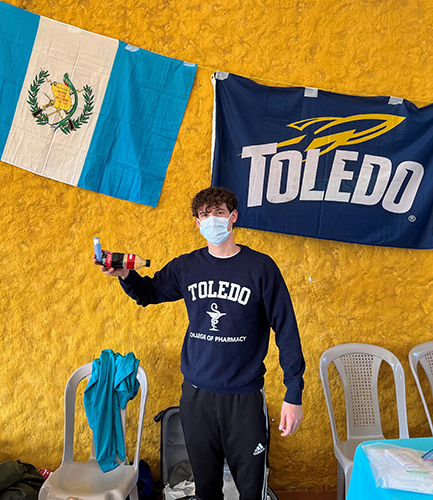When Andrew Fritz’s mother won her battle with breast cancer, she told her son about the positive impacts her healthcare providers had on her during the worst moments of her life.
Fritz was inspired to have that impact on someone else.

On a Guatemalan medical trip in December, Andrew Fritz, a first-year PharmD student, improvised the use of Coke bottles as spacers to support Guatemalan children needing doses from their inhalers.
Last December, Fritz travelled to Antigua, Guatemala, for six days with Dr. Mitchell Howard, assistant clinical professor in the College of Pharmacy and Pharmaceutical Sciences, as part of a team of physicians, nurse practitioners, orthodontists, pharmacists and UToledo healthcare students. On the first day of the trip, Fritz and Howard realized they had not brought any spacers: a device that made using an inhaler easier and more effective.
Fritz was not deterred.
“I saw Dr. Howard’s eyes shift directly to two Coke bottles on the table,” Fritz said. “He didn’t even say anything before the two of us sanitized the bottles and got to cutting and arranging the bottles in a way that reflected a spacer. We trialed three designs before perfecting them for optimal medication delivery and convenient use.”
Neither Fritz nor Howard had heard of this idea before coming up with it on the fly. The quick thinking came from Fritz’s dedication and treatment of each patient. Howard said Fritz has a deep “passion for patient care.”
“Even through long days, Andrew served each patient with dignity and special care,” he said. “As we created the ‘spacer’ for the inhalers, his innovative mind searched for improvements each day. A proud moment was getting to see a little girl breathe in the full puff of albuterol easier with the spacer coordination.”
The trip was sponsored by the Special Commission on Relief and Education and the Friends of Guatemala. The group of medical students and professionals treated 747 patients in just five days, dispensing 889 prescriptions.
“These communities were thankful for us simply respecting their humanity,” Fritz said. “This idea floored me. I was overwhelmed by the sudden realization of how much I take for granted daily. This list is extensive, but notably clean drinking water, fully functioning plumbing, access to reliable healthcare, safety in my own home and community and how every day does not feel like my sole purpose is surviving. Fully recognizing the depth of my privilege fuels my desire to help others.”
Going to Guatemala was not the first time Fritz stepped up to help large communities.
As the director of clinical pharmacy services for the student-run charity CommunityCare Clinics, Fritz has been working to supply patients who cannot afford their own medication with free prescriptions. He operated this service for 10 clinics, establishing 13 patients on 14 different medications that they would not had access to otherwise.
“I created an opportunity to implement a charitable service where I sign up our patients for prescription assistance programs sponsored by pharmaceutical companies, effectively expanding the prescribing capabilities of our clinic,” he said. “These programs grant free access to expensive and effective medications the clinic cannot afford to stock in our pharmacy.”
A native of Whitehouse, Fritz is a first-year graduate earning his doctor of pharmacy degree and his master of business administration degree. At UToledo, Fritz said he was given the right direction that allowed him to excel in his education and career path, and that opportunities such as the pharmacy program allowed “direct admission into the graduate program as a high school student.”
“It is a six-year program, I could pursue an MBA seamlessly integrated into the pharmacy curriculum, and they provide scholarships to help with undergraduate tuition.”
Fritz said he felt validated that his hours of studying topics such as spacers turned out to be important in real-life situations.
“It is one thing to sit in a classroom and absorb a bunch of different information,” he said. “But to apply everything we have learned to better the lives of our patients adds so much tangible value to our education.”